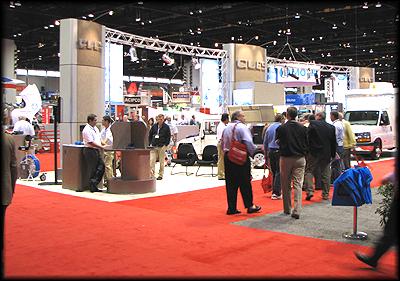 A trade show is an industry gathering in a big hall where businesses show off their latest products and network with their fellow professionals.
A trade show is an industry gathering in a big hall where businesses show off their latest products and network with their fellow professionals.
Or, a trade show is a den of intrigue, where industry players fight for position, slam the trade association and look for jobs.
No one would be surprised to find the first explanation is the official version, but the second explanation is closer to the truth.
One aspect to consider in planning a trade show is how different the environment is compared to every day office life. In the office, face-to-face communication is largely among co-workers. At the trade show, attendees can talk with whomever they please, and given the hours and hospitality suites, who knows what they’ll say?
At the trade show, wins and losses are obvious, and rank and position is more clearly identified. The trade association is often the focus of widespread dissatisfaction. How come we always get the lousy booth position at the end of the aisle and brand X is always on the 50-yard-line. How is it that they got two speakers on the program, and we didn’t get any. Why are we still meeting in Nashville, when everyone we talked to was done with it years ago.
A trade show is a great place to launch conspiracies. Friendly competitions become personal once the combatants get to know each other better. Booth size, giveaways, and gimmicks become paramount. A company’s trade show crew might be congratulating themselves on a job well done, only to have it all ruined by their competitor’s dirigible floating majestically over the convention hall. They’re giving away a Ford Mustang, and we’re giving away a pen. Well, we all know no one’s going to win that car anyway.
It’s no secret that trade shows could also be called job fairs. Where else would someone see nearly everyone else in the industry in one place? Where else could someone from California have an interview with a New York company without using precious vacation time? Plus, the attendee is already dressed and in “sales mode.” If this is part of the action, be discreet. Do not hook up with the headhunter in front of the booth, or at the crew’s favorite restaurant, or in the room that you’re sharing with a co-worker. What if the competition is interested, or indicates that they are? Do they really have an opportunity, or are they just hoping you’ll dish some dirt and reveal a trade secret or two.
Jobs can be found at trade shows, but they can also be lost. The CEO may see staff at a competitor’s booth, and wonder why is she “always” talking to them, even though “always” might only mean more than once. Or, the performance of the company might be suffering, and the trade show just confirms the CEO’s suspicions about its employees.
The best part about a trade show is the opportunity to see the industry as a group of flesh and blood players with strengths, weaknesses, and agendas. It‘s possible to learn more in three days of trade show than in six months of office routine.






